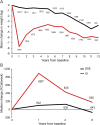Effect of a long-term intensive lifestyle intervention on prevalence of cognitive impairment
- PMID: 28446656
- PMCID: PMC5440245
- DOI: 10.1212/WNL.0000000000003955
Effect of a long-term intensive lifestyle intervention on prevalence of cognitive impairment
Abstract
Objective: To assess whether an average of 10 years of lifestyle intervention designed to reduce weight and increase physical activity lowers the prevalence of cognitive impairment among adults at increased risk due to type 2 diabetes and obesity or overweight.
Methods: Central adjudication of mild cognitive impairment and probable dementia was based on standardized cognitive test battery scores administered to 3,802 individuals who had been randomly assigned, with equal probability, to either the lifestyle intervention or the diabetes support and education control. When scores fell below a prespecified threshold, functional information was obtained through proxy interview.
Results: Compared with control, the intensive lifestyle intervention induced and maintained marked differences in weight loss and self-reported physical activity throughout follow-up. At an average (range) of 11.4 (9.5-13.5) years after enrollment, when participants' mean age was 69.6 (54.9-87.2) years, the prevalence of mild cognitive impairment and probable dementia was 6.4% and 1.8%, respectively, in the intervention group, compared with 6.6% and 1.8%, respectively, in the control group (p = 0.93). The lack of an intervention effect on the prevalence of cognitive impairment was consistent among individuals grouped by cardiovascular disease history, diabetes duration, sex, and APOE ε4 allele status (all p ≥ 0.50). However, there was evidence (p = 0.03) that the intervention effect ranged from benefit to harm across participants ordered from lowest to highest baseline BMI.
Conclusions: Ten years of behavioral weight loss intervention did not result in an overall difference in the prevalence of cognitive impairment among overweight or obese adults with type 2 diabetes.
Clinicaltrialsgov identifier: NCT00017953 (Action for Health in Diabetes).
Level of evidence: This study provides Class II evidence that for overweight adults with type 2 diabetes, a lifestyle intervention designed to reduce weight and increase physical activity does not lower the risk of cognitive impairment.
© 2017 American Academy of Neurology.
Figures


Comment in
-
Intensive intervention and cognitive impairment: Are lifestyle changes enough for a good brain?Neurology. 2017 May 23;88(21):1984-1985. doi: 10.1212/WNL.0000000000003976. Epub 2017 Apr 26. Neurology. 2017. PMID: 28446655 No abstract available.
References
-
- Rovio S, Kareholt I, Helkala EL, et al. . Leisure-time physical activity at midlife and the risk of dementia and Alzheimer's disease. Lancet 2005;4:705–711. - PubMed
-
- Cotman CW, Berchtold NC, Christie LA. Exercise builds brain health: key roles of growth factor cascades and inflammation. Trends Neurosci 2007;30:464–472. - PubMed
-
- Plassman BL, Williams JW, Burke JR, Holsinger T, Benjamin S. Systematic review: factors associated with risk for possible prevention of cognitive decline in later life. Ann Intern Med 2010;153:182–193. - PubMed
Publication types
MeSH terms
Associated data
Grants and funding
- P30 AG024827/AG/NIA NIH HHS/United States
- P30 DK046204/DK/NIDDK NIH HHS/United States
- U01 DK057219/DK/NIDDK NIH HHS/United States
- U01 DK057154/DK/NIDDK NIH HHS/United States
- U01 DK056992/DK/NIDDK NIH HHS/United States
- U01 DK057171/DK/NIDDK NIH HHS/United States
- U01 DK057182/DK/NIDDK NIH HHS/United States
- U01 DK057136/DK/NIDDK NIH HHS/United States
- U01 DK057002/DK/NIDDK NIH HHS/United States
- U01 DK057177/DK/NIDDK NIH HHS/United States
- U01 DK057078/DK/NIDDK NIH HHS/United States
- U01 DK057131/DK/NIDDK NIH HHS/United States
- U01 DK057008/DK/NIDDK NIH HHS/United States
- U01 DK057149/DK/NIDDK NIH HHS/United States
- P30 DK017047/DK/NIDDK NIH HHS/United States
- U01 DK057151/DK/NIDDK NIH HHS/United States
- K01 DK090445/DK/NIDDK NIH HHS/United States
- P30 DK048520/DK/NIDDK NIH HHS/United States
- U01 DK057135/DK/NIDDK NIH HHS/United States
- P30 DK026687/DK/NIDDK NIH HHS/United States
- U01 DK056990/DK/NIDDK NIH HHS/United States
- U01 DK057178/DK/NIDDK NIH HHS/United States
LinkOut - more resources
Full Text Sources
Other Literature Sources
Medical
Research Materials
Miscellaneous
